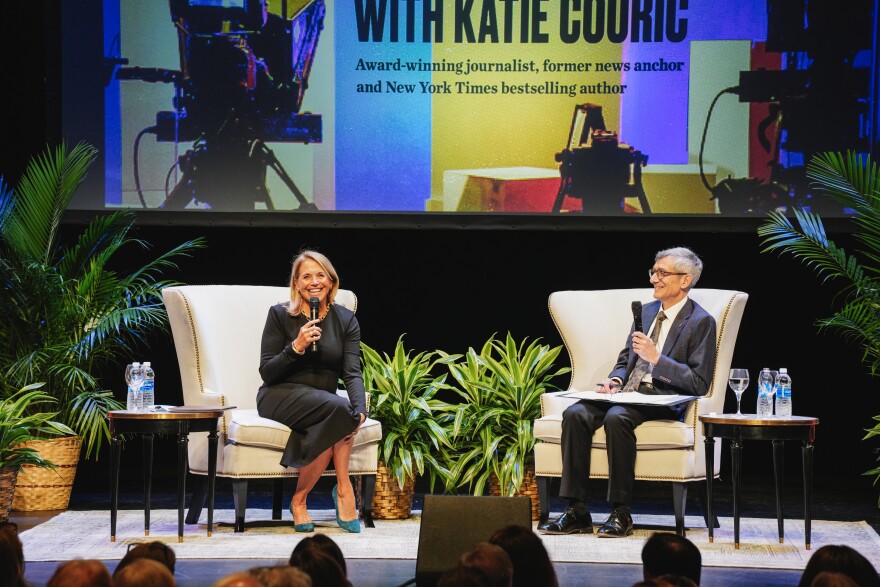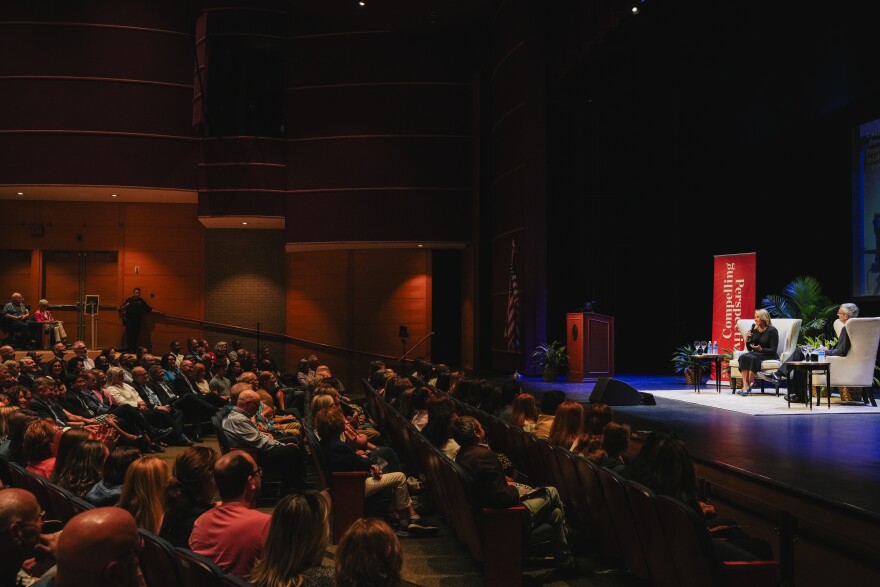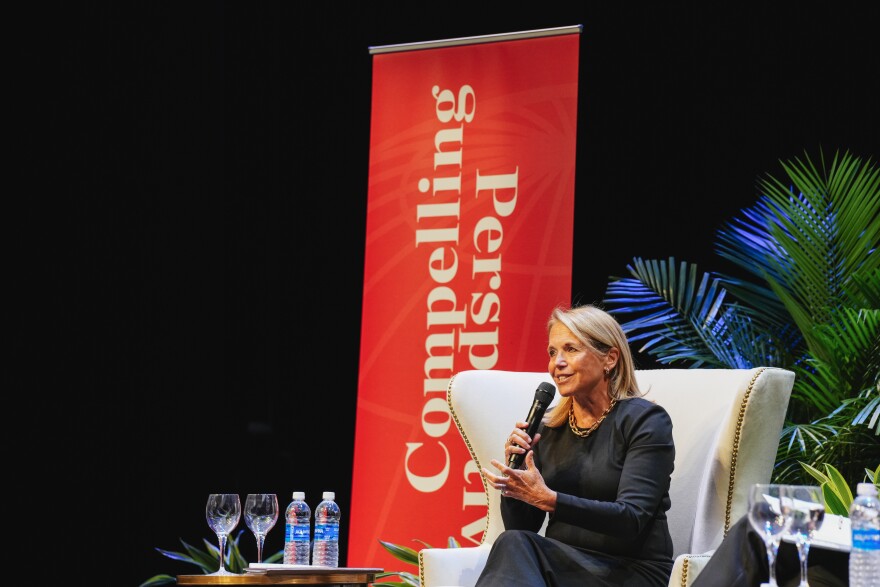BETHLEHEM, Pa. — Award-winning reporter and former news anchor Katie Couric stopped by Lehigh University on Tuesday to talk journalism, the digital age and why you should get a colonoscopy.
Couric, 67, was the first speaker in this academic year’s iteration of Lehigh’s Compelling Perspectives program, which creates a space for open conversations and respectful discourse on challenging topics. This year’s focus is the role of media in contemporary society.
Nearly 700 students, staff, faculty and community members attended the event at Zoellner Arts Center in Bethlehem. Lehigh President Joseph Helble interviewed Couric on stage about the news industry before handing it over to the audience for questions.
“I was excited to come back to Lehigh,” Couric said, noting she delivered her first commencement speech at the university in 1999.
Couric, who also received an honorary doctorate from the school, said Lehigh students persuaded her to take on the speaking gig at the time by standing outside her “Today” show studio multiple mornings in a row with signs in hand.
Couric co-anchored NBC’s “Today” show for 15 years before becoming the first woman to solo anchor an evening broadcast in 2006 when she joined “CBS Evening News.”
She then went on to host her own talk show and worked as the Yahoo global news anchor. In 2017, she founded her own media company and has since produced documentaries, daily newsletters and a podcast.
News in the digital age
At Tuesday’s fireside chat, Helble asked Couric about the media’s role in shaping public conversations and the criticism journalists sometimes receive for not being accurate.
Couric said many people exist in their own media ecosystems, only engaging with ideas they already agree with.
“We’re getting affirmation instead of information sometimes,” she said.
Couric also said the advent of the internet and the expansion of social media in the early 2000s changed how people consume news.
Helble cited 2024 data from the Pew Research Center that shows 86% of U.S. adults get their news from a digital device often or sometimes – that’s higher than those who get their news from television, radio or print publications, according to the research.

Couric said the danger of digital news is that there are no gatekeepers, and everyone can become a reporter online, but without an editor and other “guardrails.” She said media literacy and greater transparency around how algorithms serve people content could help combat misinformation.
“It’s a real problem, and I don’t know how to fix it, except we have to be much smarter,” she said.
Couric said cell phones have also been an advantage, too, in that news organizations don’t have to pay to send camera crews abroad when there's a tragedy or a revolution — people on the ground are able to capture footage on their own instead with handheld devices.
It’s a real problem, and I don’t know how to fix it, except we have to be much smarter.Katie Couric, former news anchor
When asked about the impact of generative artificial intelligence on news, she said people in the industry fall on both sides of the spectrum – some are concerned AI will replace journalists and others see AI as a tool for making reporting easier.
“Will people want to read a column written by a robot?” Couric said, adding she thinks people will instead continue to seek out the writing of “thinking, feeling” humans.
How to cover Trump
Helble asked Couric to speak about how reporters can balance fact-based reporting and avoid political bias. In response, the Murrow Award winner said she believes former President Donald Trump is an “existential threat” to journalism.
“What’s really, really hard for journalists right now is Donald Trump will not concede that he lost the election in 2020,” she said. “I think it’s really hard when you have someone perpetuating falsehoods like that to cover him as a normal person.”
She said covering Trump accurately is a “no win” situation because conservatives will call reporters biased and liberals will claim journalists normalize Trump’s behavior.
Helble also asked Couric about her 2008 seminal interviews with then-vice presidential hopeful Sarah Palin, who was widely judged as having struggled with her answers and performed poorly.
“I felt bad for her,” Couric said. “She really wasn’t quite ready for prime time.”
Couric said she doesn’t think it’s possible for an interview to have the same impact on the electorate today because of how trust in the media has declined.
Throughout Tuesday’s conversation, Couric also spoke about health screenings. Couric’s first husband Jay Monahan died in 1998 at the age of 42 from stage 4 colon cancer, she told the audience. Her sister Emily died of pancreatic cancer three years later.
Since then, Couric, a survivor of breast cancer herself, has used her platform to encourage people to get health screenings. She famously got a colonoscopy on the “Today” show in 2000 to “demystify” and “destigmatize” the procedure, which led to a 20% increase in colonoscopies across the U.S.
In 2008, she helped launch Stand Up To Cancer with a group of women to help fundraise for cancer research.

News consumers, student journalists turn out
Mary Ellen Jacobson, of Coopersburg, attended Couric’s conversation because she used to watch her on the “Today” show.
“She was always good and she raised the talent and [broke] the ceiling for women being newscasters,” Jacobson said.
Sydney Floch, a sophomore journalism major, said she appreciated Couric’s transparency on the role social media plays in civic discourse and the future of journalism.
“I think journalism in the next decade is going to be so unpredictable,” she said. “I feel like when I go into the workforce it’s going to look completely different from what it looks like now.”
Floch, who hopes to be an investigative reporter, said she plans to closely watch trends developing in the digital media landscape and keep consuming information that’s as “unbiased as possible.”
I think journalism in the next decade is going to be so unpredictable.Sydney Floch, journalism student at Lehigh University
Archer Benedict, a junior journalism major and an editor at Lehigh’s student newspaper The Brown & White, attended a small roundtable discussion with Couric ahead of the Compelling Perspectives event. Couric discussed the future of journalism, entering the workforce and disparities in testing for women’s health issues.
Benedict, who hopes to be a magazine writer, said it was nice to hear from Couric that “it’s normal to not have this perfect job right out of college,” he said.
Benedict also said Couric did her best to make the students feel comfortable talking with her.
“She was very personable, which is great, because a lot of the times these speakers come in and they’re a little stuffy, and it’s hard,” he said. “She was well-informed, she was very kind, and she was funny.”
The next Compelling Perspectives event will be on Dec. 5 when Lehigh welcomes alumnus Martin Baron, the former executive editor of The Washington Post and The Boston Globe.


